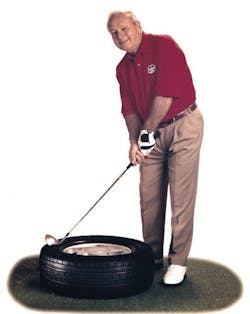Not a single person who helped bring the Cooper Tire & Rubber Co. to life in 1914 is still alive. There are no eyewitnesses to the events leading up to its creation, or with whom to share insightful stories about its formative years.
All 100-year-old companies have that problem, Cooper included. If it weren’t for yellowed newspaper accounts and a company’s own record keeping, the early years might more appropriately be labeled the forgotten years.
An examination of recent history, however, allows extra room for perspective. It is also potentially more relevant and illuminating because it is more current.
I have written about Cooper Tire since joining Modern Tire Dealer in 1985. My experience with the company only represents 29% of its past, but that time period was not without significance.
Three major events, which I experienced firsthand, were impactful not only for their time, but also on the way the company does business today. They each represent a direction that has evolved into something nobler and far-reaching.
1. Cooper Tire hired hall of fame golfer Arnold Palmer as its spokesman in 1997.
2. The Cooper Advanced Management Program, or CAMP, armed independent Cooper tire dealers with business knowledge and best practices beginning in 2002.
3. Cooper signed its first “original equipment” radial tire contract in 2008.
The ultimate goal of all three initiatives was to help Cooper’s network of independent tire dealers sell more tires. And in each case, history has since repeated itself.
Arnie’s Army
“Nice shot.” Those two words were spoken to me 17 years ago by one of the greatest golfers ever, Arnold Palmer, on the 18th tee at the Bay Hill Club in Orlando, Fla.
Cooper announced its partnership with Palmer to the media on a flight from Akron, Ohio, to Orlando in February 1997. “Arnold’s reputation and status will provide an invaluable ‘stamp of approval’ on the Cooper brand,” said tire division President John Fahl at the time. “Our intention is to create an emotional bond with customers through Palmer’s endorsement.”
Promotional materials such as 60-second radio spots recorded by Palmer were designed to help Cooper tire dealers create brand awareness in their local markets. The company also served as an associate sponsor for the Bay Hill Invitational Golf Tournament, a nationally televised Professional Golfers Association Tour event hosted by Palmer.
Members of the media played the course, which Palmer designed, then joined the golfing legend and his wife, Winnie, in the clubhouse afterward.
But we met Palmer on the 17th green. He watched us tee off on the par 4 18th hole, and I was fortunate enough to hit a drive straight down the middle, earning Palmer’s praise.
Cooper’s association with Palmer ended quietly in 2004, about the time the company began sponsoring its own racing series. The goal was to promote the new Zeon ultra-high performance tire line. This year, Cooper sponsors three IndyCar-sanctioned series: the Cooper Tires USF2000 Championship Powered by Mazda, Indy Lights Presented by Cooper Tires and the Pro Mazda Championship Presented by Cooper Tires. It also sponsors the Cooper Tires Prototype Lites Championship Powered by Mazda.
For the last seven years, it has been the exclusive sponsor of the ABC College Football Halftime Show. And it remains the official tire of the Professional Bull Riders Inc. tour.
Overseas, Cooper will partner with the Arsenal Football Club in the English Premier soccer league for the 2014-2015 season.
A celebrity spokesperson tends to be focused on a specific demographic, and that’s not what Cooper is trying to accomplish with its current sports marketing strategy, says Chris Ostrander, president of Cooper’s Americas Operations. “We really want to get a much broader geographical reach for our marketing dollars by supporting sports that span a more comprehensive, wide-ranging assortment of consumers.”
Sports marketing and motorsports play key roles in Cooper’s marketing plans, according to Ostrander.
“There’s definitely an emotional connection to our brand, which, ultimately, is going to translate to increased levels of awareness and familiarity.”
He says there is also an added benefit from Cooper’s motorsports involvement.
“Motorsports... not only enables us to connect with diverse consumer groups, it also gives us an opportunity to transfer the technology from these extreme performance products to our core set of products.”
[PAGEBREAK]
Going to CAMP
The inaugural CAMP, a three-session program held between May 2002 and March 2003, was attended by 20 tire dealers, myself and Greg Ring, then Cooper Tire’s sales and marketing training manager. Ring told us the primary objective of the program was to provide business skills training, educational opportunities and succession planning assistance to Cooper dealers.
“It was a popular program at its time,” says Ring, now senior account executive. “So were the mini-CAMPs, which focused on specific subject areas, such as effective financial management (which was covered in the first session) and sales and marketing skill training.”
The dealers learned about leadership and performance management in the second session. When asked to define leadership, they used words like “teamwork” and “vision.”
Dave Wehr, executive vice president of Tire-Rama Inc. in Billings, Mont., defined it as “surrounding yourself with a management team, empowering them and getting out of the way.”
Twelve years later, Wehr, now Tire-Rama president, still lives by that definition.
“Probably the best thing about CAMP was meeting other dealers and making good friends in the industry,” he says. “I constantly see many of them at different manufacturer functions and the SEMA Show. We talk about the business climate, vendor programs and business philosophies, which helps me in my business today.”
In the third session, the dealers were put into groups as part of a business simulation exercise designed to “cultivate market niches” in the retail aftermarket. The rest was up to the dealers, who were penalized for not having bay space or employees when a customer came calling.
Scott Creighton, then executive vice president and chief operating officer of Colony Tire Corp. in Edenton, N.C., was not penalized.
“You can’t lay off your employees when it is slow,” says Scott Creighton, now president of the 24-store retail and commercial chain. “You always have to be a little undermanned to be profitable.
“If a customer comes in and can’t be serviced right away, we’ll offer him a ride to work or home. We’ll get it done. And you’ll keep the customer.”
The CAMP no longer exists. In its place is a unique online training program for dealers that is being introduced this month: eCooper University Training Rewards.
The program “goes beyond the foundation of comprehensive product training to provide customers with instruction and insight on a wider array of topics,” says Ostrander.
“There are several courses on operating a successful business, including Financial Basics, Human Resources, Business Operations, Advanced Finances, Marketing and E-Marketing. Several of the business-based learning modules are built on topics addressed in Cooper’s former and very successful CAMP program, and have been brought up-to-date for today’s e-learning environment. Of course, the extensive product training regarding Cooper tires and the tire industry remain in place.
“In addition to expanded and enhanced training, the new eCooper University Training Rewards program offers a structured rewards program based on progressive learning,” he says. “As they complete courses, customers earn points that translate to various levels of certification from Cooper as well as rewards to incentivize their teams to learn more as they build their business with Cooper.”
OE has to start somewhere
Cooper dipped its toe in OE waters for the first time in 2008. Roush Performance Products Inc. needed a tire for its 2009 modified Mustangs, and the collaboration resulted in the Cooper Zeon RS3.
Cooper referred to the RS3 as a type of OE tire, although the company had no OE market share. The “Official Tire of Roush Performance” was available in one W-rated blackwall size: 275/40R18.
In February 2013, the Cooper Zeon RS3-A, in size 215/50R17, was selected by Ford Motor Co. as a standard fitment for the 2013 Ford Focus SE and Titanium models. The fitment gives Cooper a 1% share of Ford’s OE business in the United States.
“It’s been a very highly successful program for us,” says Ostrander.
“In the short amount of time we’ve been working with Ford, it’s certainly been the right journey for Cooper to undertake, and one that we’re going to continue to expand on. One of the things we’ve communicated externally is that we don’t plan on expending more than 10% of our North American production on the OEM segment by 2020. But that said, 10% isn’t insignificant.”
Ostrander says there are a lot of benefits to being in the OE business, above and beyond increased brand awareness.
“Since we launched with Ford, I’ve been very consistent in saying OE must make us a better company and be profitable. It’s driving operational improvements within our plant, and we also see the benefit of improved brand awareness aligned with our brand strategy.”
It also opens up the auto dealership replacement channel for Cooper. According to the 2014 MTD Facts Issue, auto dealerships account for 7.5% of the replacement consumer tire sales in the U.S. Ostrander describes Cooper’s participation in this channel as “very little today.”
“As we expand into more OE programs, this channel will become an attractive growth opportunity for Cooper,” he adds.
In late 2013, Cooper signed a letter of intent to supply low rolling resistant tires to Elio Motors Inc. The Michigan-based startup company wants to produce a three-wheeled, two-passenger vehicle that will achieve up to 84 miles per gallon.
Next stop: 200 years
No company can survive for 100 years without being successful. Despite the inevitable ups and downs, members of the century club have stood the test of time.Cooper joined its ranks this year.
Over the last 29 years, it has been particularly successful; since 1985, its annual sales have grown almost sevenfold, from $522.6 million to $3.4 billion. It is the 11th largest tire manufacturer in the world.
According to the U.S. Small Business Administration, about one-third of all new establishments survive at least 10 years, and up to 12% of all businesses close each year. More than 33,000 businesses declared bankruptcy in 2013.
Less than one in 10 publicly traded companies in the U.S. is 100 years old, based on data from Standard & Poor’s Capital IQ, a division of Standard & Poor’s Financial Services LLC.
Cooper already has beaten the odds of survival. Will it still be around 100 years from today in 2114? That is the goal.
Philosopher George Santayana is perhaps best known for this famous quote about history: “Those who cannot remember the past are condemned to repeat it.” Cooper, which began with the acquisition of a tire repair manufacturing company, has a track record of profitability. Its leaders are counting on remembering the past and repeating that success.
If that happens, I won’t be there to celebrate. It will be another would-be historian’s turn to reminisce. ■



